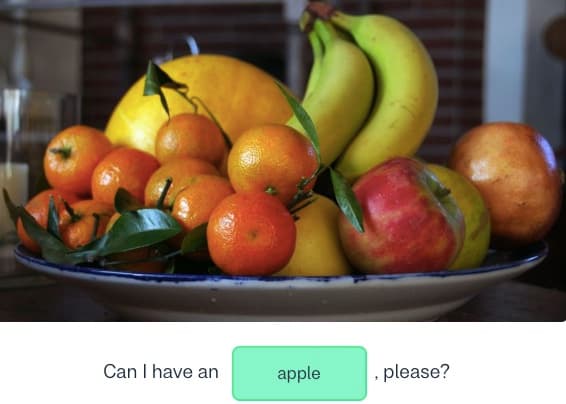I want to learn...
Author:

Chiara Pegoraro
Have you ever wondered why we say a but an? Maybe you know this one, but do you know why do we say an but a? And for an extra challenge, why do we say I’ll eat Did you notice that there is no article before “water”?
Welcome to the world of indefinite articles! It can seem like a tricky concept, but in this article we will answer all of these questions and more using plenty of helpful examples and tips so you can master the indefinite article once and for all.
What is an indefinite article?
Let’s start with the basics. Articles are those little words a, an, and the that we put before nouns. Not all languages have them and there are different rules about how and when to use them. Articles may seem insignificant, yet a sentence would be incorrect without them.
In English, we differentiate between definite and indefinite articles.
A and an are indefinite articles. The is a definite article.
They both serve the function of specifying a noun, but they differ on meaning. Let’s look at a few examples.
I bought a book yesterday.
Here is the book that I borrowed, thank you!
I want to eat an apple.
Where is the apple that I brought for lunch? I left it on my desk.
As you can see, in both cases a and an refer to a generic, unspecified book or apple, while the refers to a specific and identified book and apple. The book that I borrowed from you, not any other book and the apple that I brought for lunch, not any other apple. So the definite article is always used when referring to something that is known to both speaker and listener.
Find out more about the definite articles in this article, but for now, let’s focus on the indefinite articles and find out why there are two, and how they differ.
Indefinite articles: When to use a and when to use an
This next bit is very important because it can be a little counterintuitive at times but bear with us, it’s going to be important. The reason there are two articles a and an is all about the sound.
Put simply, an is used before a word that begins with a vowel, a is used before a word that begins with a consonant. Here are a couple of examples for each letter of the alphabet.
Examples of the indefinite article “an”
an apple, an alligator
an elephant, an experience
an idea, an information
an office, an oven
an umbrella, an uncle
Examples of the indefinite article “a”
| a bar, a book | a cat, a chair |
|---|---|
| a dog, a dollar | a flower, a friend |
| a garden, a guitar | a hat, a house |
| a jacket, a job | a key, a kitchen |
| a lemon, a library | a minute, a mountain |
| a necklace, a Nintendo | a pen, a phone |
| a question, a quilt | a radio, a robot |
| a shoe, a song | a table, a tree |
| a vase, a violin | a whale, a wig |
| a xylophone | a year, a yogurt |
| a zebra, a zoo |
Indefinite article exceptions
This should be pretty straightforward, right? A word starting with a vowel is preceded by an, a word starting with a consonant is preceded by a. But what about the examples we used at the top of this article: an hour, a university? Are these exceptions? Not really. You see, when we talk about vowels and consonants we are talking about two different sounds.
Indefinite article for words beginning with u
Sometimes, a letter like “u”, which is a vowel, can sound different and function as a consonant, in which case it would use the indefinite article a. Take the pronunciation of these words, for example:
uncle (uhn-cle)
umbrella (uhm-brella)
university (yoo-niversity)
user (yoo-ser)
You see? Or even better, can you hear the difference? University and user have a completely different first sound compared to uncle and umbrella. That’s because the “u” in these words is not pronounced as a vowel at all, it’s a semiconsonant and therefore, it will have the article a.
Tip: To make things easier, remember that all words starting with uni- will have this feature: a unicorn, a unit, a uniform, a universe.
This doesn’t happen very often, but it’s worth remembering. And it doesn’t only affect words starting with “u”.
Indefinite article for words beginning with o
The same rule applies for the letter ‘o’ regarding expressions beginning with one or once:
a one-woman show
a once-in-a-lifetime opportunity
In both cases, the word doesn’t have the typical “oh” sound of a vowel like many words starting with “o” have –office, oven, olive. Instead, these words have a “w” sound like the consonant, so they use the indefinite article an.
an office
an oven
an olive
Indefinite article for words beginning with h
The opposite happens with the letter “h”. It is usually a breathy sound, a gentle exhale, but in a few cases, it’s completely silent. The words house, hat, heart, and home have all that gentle exhale at the beginning, right? But words like: hour, honest, herb, homage and heir have no breathy sound at all. In fact the “h” is silent, and the first sound of the word is the following vowel. Therefore, we use the article an in these cases:
an honest mistake
an hour
an homage to my home town
an herb
a house
a hat
a heart
a home
Indefinite article with acronyms
Acronyms work in the same way, simply use the article that matches the sound of the first letter in the acronym. Here are a few examples of sentences and acronyms you might come across:
They took a DNA sample.
It’s an AA meeting.
He was an NBA player for more than 10 years.
There was a UFO sighting.
NBA, starts with the letter “n” but is read “en-” making it a word that starts with a vowel. On the other hand UFO has that “yoo” sound like the constant y that needs to be preceded by the article a.
To sum up, when in doubt, focus your attention on the pronunciation of the first sound of the word. Are you hearing a vowel or a consonant sound? The answer will ensure you choose the correct article without fail.
Are indefinite articles always singular?
Yes. Indefinite articles are only used with singular nouns. When we need to use a plural noun we can either skip the article altogether or use the definite article the. Look at this sentence for example:
I brought a sandwich for Sarah.
I brought sandwiches for everyone.
I brought the sandwiches for everyone.
So, apparently, the person speaking is in charge of giving Sarah a sandwich, good for Sarah. If that same person is in charge of bringing multiple sandwiches to multiple people, how would we convey that? In the end it’s a generic sandwich, not one that was mentioned before in the same discourse and as the rules go, we should use the indefinite article. However, it would be incorrect to say I brought a sandwiches for everyone, because the indefinite article just doesn’t go with plural nouns. In this case we don’t need an article at all, unless we have already mentioned sandwiches before and we can use the sandwiches like in the third example.
Don’t get confused by words that have a plural meaning but are in a singular form. Look at these sentences:
I brought a few sandwiches.
There are a number of English learners.
The indefinite article refers to “few” (a small quantity) and “number” that are both singular and both want an article, even if their meaning is indeed plural. This brings us to the next topic: uncountable nouns.
When not to use indefinite articles
We don’t use indefinite article when there is an uncountable noun. Uncountable nouns refer to an object, a concept or a substance that is considered as a single mass. This might include words like water, air, electricity but also words that might be countable in languages other than English like information, fruit, advice, furniture.
These words typically don’t have a plural form and don’t take the indefinite articles a, an. For example:
I need water, I am so thirsty!
We all need air to live.
This runs on electricity.
I need information about this before I make my decision.
I love fruit!
I need advice, can you help me?
We need to buy new furniture, this stuff is old and depressing.
You see? No need for articles here. All these sentences refer to generic substances or objects. And also when we need to refer to a specific one, we would never say, for instance, a water, that would be incorrect. Instead we use a variety of words to express quantity.
I drank two glasses of water.
I need a breath of fresh air.
This appliance consumes a ton of electricity.
Here is some information you requested.
Do you want a piece of fruit?
Here is a piece of advice for you…
There is space for a new piece of furniture here.
Tip: Remember, uncountable nouns include words describing liquids (water, wine, milk, gasoline, coffee, tea), abstract ideas (advice, chaos, information, motivation), natural phenomena (sunshine, rain, snow) and activities (sleep, fun, anger).
Where do indefinite and definite articles go in a sentence?
As we mentioned above, articles refer to nouns. But the word order of sentences may mean that there could be a few words in between the noun and the indefinite article. For example:
a sweater
a red sweater
a warm red sweater
It doesn’t matter how many words you want to use to describe the sweater. You can add adjectives to give information about the color (red), the purpose (warm), the style (Christmas), the size (big), the material (wool), the shape (long-sleeved) or, yo could go crazy and add all of those words together and have:
a big, long-sleeved, warm, red wool Christmas sweater.
This won’t change the fact that a is still referred to sweater even with all of these other words in between.
However, if the first word to describe the noun begins with a vowel sound, we will use the indefinite article “an”. For example:
an ugly, long-sleeved, warm, red, wool Christmas sweater
an Abercrombie sweater
an elegant sweater
an iconic sweater
an olive green sweater
an ugly sweater
Go beyond indefinite articles
Now you know about the rules of indefinite articles, you’ll be using them so frequently that they’ll become second nature in no time. Remember to always listen to the first sound of a word rather than relying on the spelling and pay attention to those uncountable nouns.
The learning doesn't have to stop now. Keep up the momentum by checking out Busuu’s complete English course.
AUTHOR

Chiara Pegoraro
Newlanguages


